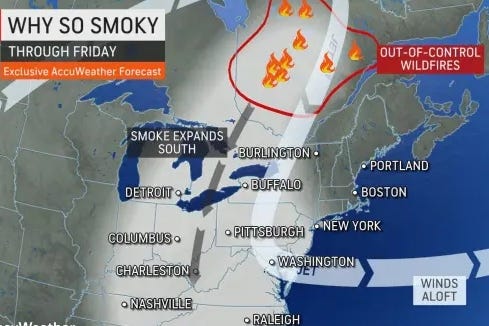
DETROIT (WWJ) - Southeast Michigan's air quality woes continue to hang overhead as winds bring more smoke from forest fires raging out of control in Canada for a second straight day.
The National Weather Service said air quality will continue to degrade, prompting officials with the Michigan Department of Environment, Great Lakes, and Energy (EGLE) to issue yet another Action Day for elevated levels of fine particulate in the following counties:
• Midland
• Bay
• Huron.
• Saginaw
• Tuscola
• Sanilac
• Shiawassee
• Genesee
• Lapeer
• St. Clair
• Livingston
• Oakland
• Macomb
• Washtenaw
• Wayne
• Lenawee
• Monroe
The Air Quality Alert is in effect through Friday, June 9th.
"Smoke originating from wildfires in Quebec and Ontario, Canada are currently impacting PM2.5 concentrations at the surface across much of Michigan," the NWS said. "Pollutants are expected to be in the UNHEALTHY FOR SENSITIVE GROUPS range with some hourly concentrations reaching the UNHEALTHY LEVEL."
The area's main pollutant, PM2, includes emissions from combustion of gasoline, oil, diesel fuel, and in Southeast Michigan's case, wood.
"The health effects of particle pollution exposure can range from relatively minor (e.g., eye and respiratory tract irritation) to more serious health effects (e.g., exacerbation of asthma and heart failure, and premature death)," The Detroit Health Department said. "Older adults, pregnant women, children, and people with preexisting respiratory and heart conditions may be more likely to get sick if they breathe in wildfire smoke."
When they reach a certain point, PM2.5 pollutants can even affect healthy populations.
So what can residents do?
Dr. Lawrence MacDonald of DMC Huron Valley-Sinai Hospital told WWJ the best course of action is to have one.
"If you have asthma or COPD or any other lung disease, you have to have a plan that you make with your physician or primary care provider that has to do with, 'what if I have symptoms or what if other things happen, what do I do next?'" MacDonald explained. "There's nothing wrong with going to the emergency department or urgent care, but you have to have a plan that your doctor can make with you."
MacDonald said those plans typically the use of inhalers, discussing when to get on steroids, or even staying home from work and staying indoors.
"Symptoms that you could have would be coughing, wheezing, shortness of breath, tightness in your chest," MacDonald continued.
For asthma sufferers, MacDonald recommended utilizing a peak flow meter and using it daily to note where your peak flow is. If you see it decreasing, then its time to talk to your doctor.
"If you don't have a diagnosis when you go outside today or any other days, [and[ you have those symptoms, you may have undiagnosed asthma," MacDonald cautioned. "And that would be a good reason to visit your primary care provider."
MacDonald said weather conditions maybe deceiving and while Detroit doesn't have the same apocalyptic orange haze that shrouded New York City on Wednesday, that doesn't mean the air is any more healthy.
"It's probably not a bad idea to not perform activities outside that require a lot of breathing," he cautioned. "Those things that you mentioned, cutting grass, exercising outside -- not a great idea."
MacDonald said a number of things can set off asthma, such as perfume, smoke, dust, cold air, hot air, even a lot of pollen.
But smoke and smoking are the top offenders.
"If you smoke, you've, you've really missed the boat and you're hurting yourself," MacDonald stated.
MacDonald said while it's hard to tell if they're seeing more patients due to the hazardous air quality, his facility is definitely seeing an uptick in patients.
"Certainly this time of year, it's, it's very, very busy for any respiratory physician, primary care doctors who take care of anybody with lung disease," he continued. "This is the time of year. This is, this is when it happens."
For people with heart or lung disease, older adults, children, and teens, the Detroit Health Department recommend the following steps to reduce exposure:
• Stay indoors as much as possible.
• Keep windows and doors closed, if possible
• Consider moving physical activities indoors or rescheduling them.
“We are continually monitoring the situation and are in close contact with our partners at EGLE, the City’s Department of Homeland Security and Emergency Preparedness, as well as the City’s Environmental division,” said acting Chief Public Health Officer, Christina Floyd. “As conditions warrant, we will provide additional updates and guidance to help make sure our residents stay safe.”
For more information, please see the Michigan Department of Environment, Great Lakes, and Energy Air Quality Index page at http://ww.deqmiar.org.
